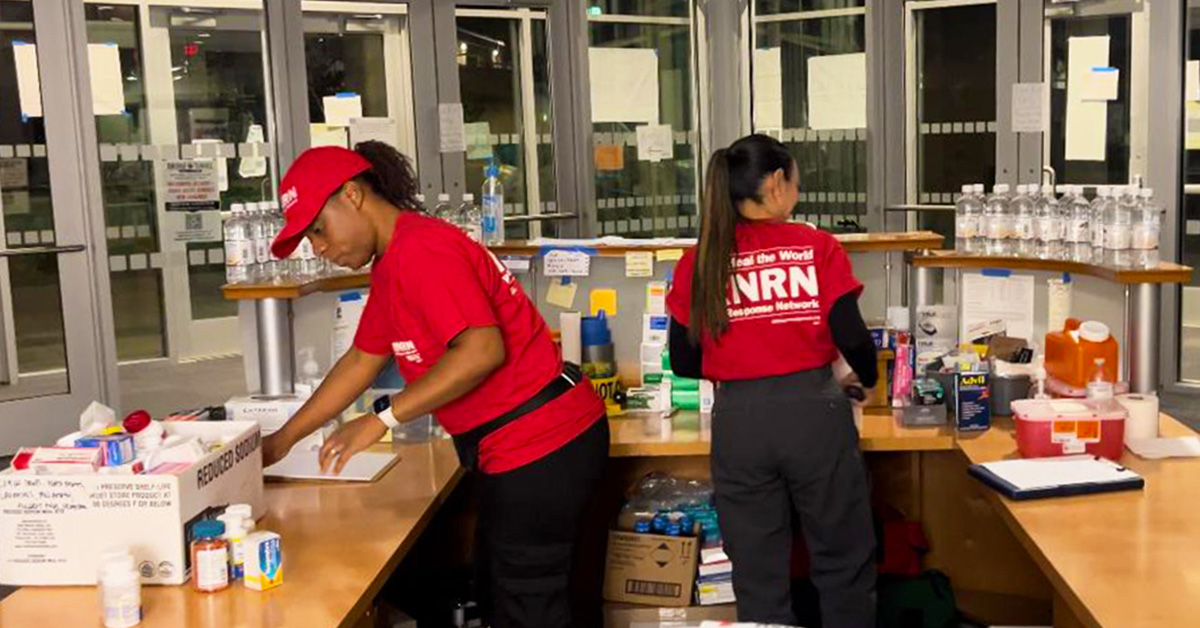Press Release
Nurse volunteers deployed to Asheville to support Hurricane Helene recovery

Registered Nurse Response Network (RNRN), in partnership with International Medical Corps, deployed two teams of nurse volunteers to Asheville, N.C. to support the Hurricane Helene recovery. The fourteen nurses who volunteered on the Asheville RNRN deployment cared for residents who had arrived at shelters and clinics in the immediate aftermath of the unprecedented storm.
“When we arrived in Asheville and began our work in the shelters, recovery efforts had just begun to tackle the immense scale of Helene’s destruction,” said Mary-Jane Perry, RN from Sacramento, Calif. “People’s loved ones, homes and belongings, and livelihoods had washed away with the mud and water. Roads and highways were destroyed. The power was out. The water was contaminated. With these kinds of conditions, the residents in these shelters and clinics faced a tremendous amount of uncertainty and anxiety about their futures.”
Since its formation in 2005, RNRN – a disaster-relief project of the California Nurses Foundation (CNF) and National Nurses United (NNU) – has sent teams of nurses to help, following disasters in locations across the United States and around the world. Traveling from Tennessee, Arizona, New York, California, Minnesota, and Florida, the first team of RNRN volunteers was deployed to Asheville on Oct. 11 and the second team on Oct. 23.
“During our shifts, we provided basic health care to anyone who needed it,” said Venessa Soldo-Jones, RN from Minneapolis, Minn., who also served as a team lead on the first deployment. “If folks needed referrals to emergency and mental health services, in collaboration with the agencies on the ground, we connected them to more support. Otherwise, we helped dozens of Asheville residents tend to injuries and wounds, monitor for infectious diseases, and manage their pre-existing medical conditions. On night shifts, we administered over-the-counter medications and eased people through conversation and connection to help them sleep.”
Nurses who participated in the RNRN deployment noted that much of their role included taking care of people’s emotional well-being.
“When you’re in a shelter, away from home, your things, and your people, something like upset sinuses can be even more upsetting,” said Carlton Purvis, RN from Memphis, Tenn. “The small ailments and small complaints can be a lot more uncomfortable when you’re in an uncomfortable situation. So we were as much managing people’s moods as providing medical services – and making sure they know that we’re here if they need us.”
Some clinics where RNRN nurses were stationed had mobile trucks that provided hot showers and laundry services to residents. Staff with local organizations also helped residents connect to transitional housing and to transportation to family and friends outside the impacted area, as the long recovery continues.
“It wasn’t the life- and limb-saving heroics we regularly do in our hospital shifts, but the care we provided over the course of several weeks helped make a difference,” said Sandy Reding, RN from Bakersfield, Calif. and a president of California Nurses Association/National Nurses Organizing Committee. Reding also served as a team lead for the second deployment.
Reding continued, “Many residents expressed their gratitude to us. One person told me, ‘We have to be here, but you don’t have to be. You stepped up and came here to help us. We needed you.’ But that’s what nurses do. We have the skill-set and the mind-set, as well as the RNRN vehicle, to deploy immediately after disaster strikes to help communities begin their healing.”
The devastation from Hurricane Helene is just coming into focus–and it’s clear that recovery efforts will continue for a long time. The updated death toll in North Carolina rose to over 100 people. The hurricane, which swept through the Gulf Coast and southeastern United States, killed over 200 people and left billions of dollars in damage. Asheville residents are only expecting their drinking water to be restored by mid-December.
RNRN, a project of NNU and the California Nurses Foundation and a 501(c)(3) nonprofit, is a national network of direct-care RNs powered by National Nurses United that coordinates sending volunteer RNs to disaster-stricken areas where and when they are needed. Interested RNs can sign up here to volunteer.